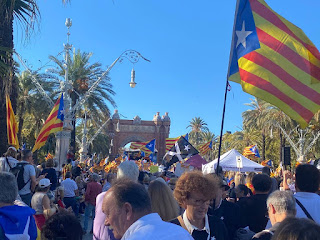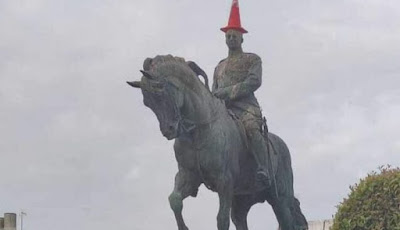At dawn, as 83 years ago, the Catalan Nationalist Youth was in the Castle of Montjuïc whre the Spaniards shot the Catalonia's President lluís Companys. Serveral leaders of the main patriotic party Junts (Together) as former Catalan Speaker Laura Borràs and former politicals prisoners and MPs Jordi Turulll and Josep Rull attended the event.
 At
dawn on October 15, 1940, Lluís Companys, then President of Catalonia,
was put before a firing squad in the moat of Montjuic Castle in
Barcelona and shot. The detail of soldiers executed the sentence of a
court martial, pursuant to regulations recently imposed by General
Franco's fascist regime. The German Gestapo had handed over to their
fellow Spanish Secret Police only a few months earlier a 58 year old man
who represented a country they wanted to ridicule in defeat and to
teach a lesson for the future.
At
dawn on October 15, 1940, Lluís Companys, then President of Catalonia,
was put before a firing squad in the moat of Montjuic Castle in
Barcelona and shot. The detail of soldiers executed the sentence of a
court martial, pursuant to regulations recently imposed by General
Franco's fascist regime. The German Gestapo had handed over to their
fellow Spanish Secret Police only a few months earlier a 58 year old man
who represented a country they wanted to ridicule in defeat and to
teach a lesson for the future.Special Edition: Lluís Companys, October 1940 123rd Catalan President executed by Spanish government
 |
| Download and share |
Waiting for Spain’s apology
In the summer of 1940,
during the dictatorship of Franco, the exiled Catalan President Lluís
Companys was detained in France, and was then taken by French and
Gestapo officers to Francoist authories in Spain, who executed him. This
15th of October will be the 74th anniversary of his execution.
On 15 October 2008,
the Commission on Dignity and the Vice-President’s Office of the
Generalitat of Catalonia put together an Act of Amends to ex-President
Lluís Companys, along with the Consul of Germany, Christine Gläser, and
the Consul of France, Pascal Brice read more...
Catalonia's President Lluís Companys
Arrested by the Gestapo, executed by Franco, still a convict in Spain 2014.
 At
dawn on October 15, 1940, Lluís Companys, then President of Catalonia,
was put before a firing squad in the moat of Montjuic Castle in
Barcelona and shot. The detail of soldiers executed the sentence of a
court martial, pursuant to regulations recently imposed by General
Franco's fascist regime. The German Gestapo had handed over to their
fellow Spanish Secret Police only a few months earlier a 58 year old man
who represented a country they wanted to ridicule in defeat and to
teach a lesson for the future.
At
dawn on October 15, 1940, Lluís Companys, then President of Catalonia,
was put before a firing squad in the moat of Montjuic Castle in
Barcelona and shot. The detail of soldiers executed the sentence of a
court martial, pursuant to regulations recently imposed by General
Franco's fascist regime. The German Gestapo had handed over to their
fellow Spanish Secret Police only a few months earlier a 58 year old man
who represented a country they wanted to ridicule in defeat and to
teach a lesson for the future.
Exiled
in France after the victory of General Franco in the Spanish Civil War,
he was arrested by the Nazi secret police in La Baule-Escoublac
(Brittany) on 13th August 1940, an arrest witnessed by a policeman who
had come expressly from Spain. Mr Companys was first interrogated by
that officer at La Santé prison in Paris, he was placed under his
custody and taken to Madrid, where he was tortured read more...
Arrested by the Gestapo, executed by Franco, still a convict in Spain 2014.
 At
dawn on October 15, 1940, Lluís Companys, then President of Catalonia,
was put before a firing squad in the moat of Montjuic Castle in
Barcelona and shot. The detail of soldiers executed the sentence of a
court martial, pursuant to regulations recently imposed by General
Franco's fascist regime. The German Gestapo had handed over to their
fellow Spanish Secret Police only a few months earlier a 58 year old man
who represented a country they wanted to ridicule in defeat and to
teach a lesson for the future.
At
dawn on October 15, 1940, Lluís Companys, then President of Catalonia,
was put before a firing squad in the moat of Montjuic Castle in
Barcelona and shot. The detail of soldiers executed the sentence of a
court martial, pursuant to regulations recently imposed by General
Franco's fascist regime. The German Gestapo had handed over to their
fellow Spanish Secret Police only a few months earlier a 58 year old man
who represented a country they wanted to ridicule in defeat and to
teach a lesson for the future.Lluís Companys' Legacy
74 years of national and democratic humiliation
 On
August 13, 1940 began what would become a dark chapter in the history
of Catalunya. The Franco regime was about to perpetrate a unique crime:
the murder of a democratically elected President. Six men stormed the
residence of Lluís Companys, President of the Catalan government, at La
Baule in Brittany. He was captured by four men in German Nazi police
uniforms and two civilians. One of them was Pedro Urraca Redueles,
officially a police attached in the Spanish embassy in Paris, in reality
a spy paid by the Franco regime to serve as liaison with the Gestapo
and the Vichy Regime and to coordinate in part the repression of Spanish
republican exiles in France. On that day Lluís Companys started a
journey that would end tragically two months later, on October 15, 1940,
with his execution in Montjuïc, Barcelona, after an illegal ... read more
On
August 13, 1940 began what would become a dark chapter in the history
of Catalunya. The Franco regime was about to perpetrate a unique crime:
the murder of a democratically elected President. Six men stormed the
residence of Lluís Companys, President of the Catalan government, at La
Baule in Brittany. He was captured by four men in German Nazi police
uniforms and two civilians. One of them was Pedro Urraca Redueles,
officially a police attached in the Spanish embassy in Paris, in reality
a spy paid by the Franco regime to serve as liaison with the Gestapo
and the Vichy Regime and to coordinate in part the repression of Spanish
republican exiles in France. On that day Lluís Companys started a
journey that would end tragically two months later, on October 15, 1940,
with his execution in Montjuïc, Barcelona, after an illegal ... read moreFranco's persecution of the Republican refugees in France
 Just
after Hitler’s armies had defeated France, Franco's Government took
advantage of the victory of its Nazi allies and began to act against the
Republican exiles in French territory. On the one hand, it tried to
destroy all the organizations that the refugees were maintaining in
exile and to expropriate their properties and documentation; on the
other hand, with the collaboration of Germany, it tried to get various
Republican personalities who were in the "German-Occupied Zone" arrested
and transferred to Spain, while getting others who were in the Vichy
"Free Zone" arrested and extradited ... (read more)
Just
after Hitler’s armies had defeated France, Franco's Government took
advantage of the victory of its Nazi allies and began to act against the
Republican exiles in French territory. On the one hand, it tried to
destroy all the organizations that the refugees were maintaining in
exile and to expropriate their properties and documentation; on the
other hand, with the collaboration of Germany, it tried to get various
Republican personalities who were in the "German-Occupied Zone" arrested
and transferred to Spain, while getting others who were in the Vichy
"Free Zone" arrested and extradited ... (read more)

























































